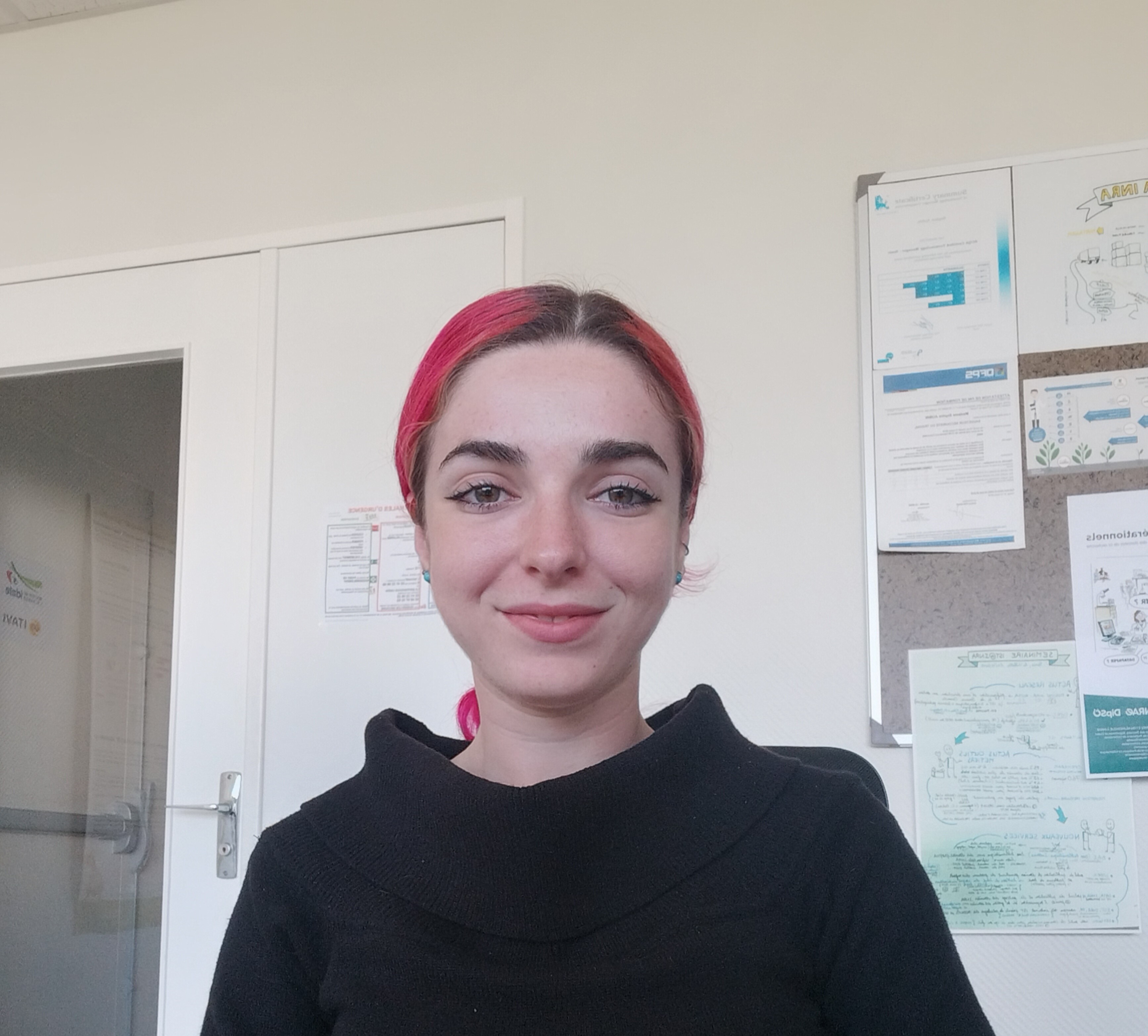
The FAIR-IMPACT national roadshow was held in Paris on September 11, 2024, at INRAE headquarters, in conjunction with the French EOSC tripartite event.
The French scientific community turned out in force, with over 140 people online and 17 on-site. A great variety of research institutes and infrastructures, universities and colleges, as well as ministries, were represented, making this event a great opportunity to share and improve knowledge on FAIR implementation and related European Open Science Cloud (EOSC) ambitions.
The aim of this event was also to present the work done in France on the national level. Different partners showed their work, skills, and tools developed thanks to FAIR-IMPACT and other related EOSC projects.
Replay the event and view slides on the dedicated FAIR-IMPACT webpage.
By Sophie Aubin, Carmen Corre (INRAE-DipSO)
EOSC & FAIR-IMPACT context
The session was introduced - in French! - by Ingrid Dillo, leader of FAIR-IMPACT. Ingrid underlined the long-term engagement of the French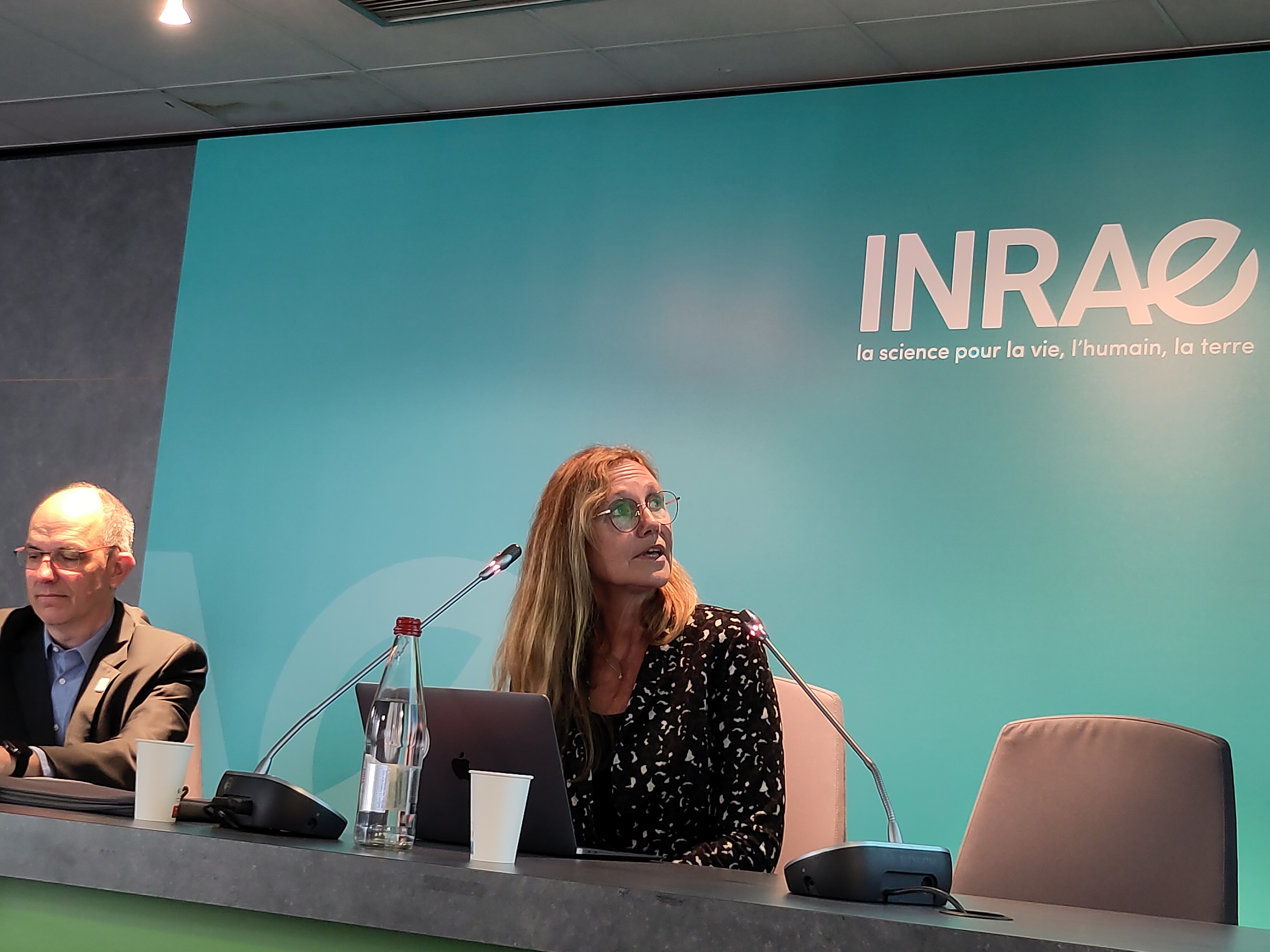 research community in the open science movement. She highlighted the links to be made between the ambitions of the FAIR-IMPACT project and the second French national plan for open science. Particularly about the “share and open research data” and “open and promote source codes” parts of the plan. The presentations given at this event should enrich French realisations on these subjects.
research community in the open science movement. She highlighted the links to be made between the ambitions of the FAIR-IMPACT project and the second French national plan for open science. Particularly about the “share and open research data” and “open and promote source codes” parts of the plan. The presentations given at this event should enrich French realisations on these subjects.
She then gave some background information on EOSC at the European and French levels. Emphasis on node organisation of EOSC, that federates different communities at EU, country, infrastructural, or thematic level.
The FAIR-IMPACT project is a part of the EOSC ecosystem vision to “develop a web of FAIR data and services”. In the current situation, very few repositories are known and used by researchers, and in the same way, very few research data are aligned with the FAIR practices (licence, PIDs, etc.). In this context, the FAIR-IMPACT project is focused on expanding FAIR solutions across Europe.
Thanks to the various domain and organisational levels of the FAIR-IMPACT consortium, we are able to identify FAIR practices and translate these to be adoptable in other domains (successful elements from one domain to the others). Another objective of the project is to think about and implement the support, governance, and coordination mechanisms that are needed to implement FAIR solutions and make sure that all of these will continue to function in the future of EOSC.
French partners of the project consortium are INRAE, CNRS, INRIA, Observatoire de Paris, Aix-Marseille University, and eScienceData Factory.
The organisers would like to extend their warmest thanks to Ingrid for making the trip to Paris, and to Volker Beckmann (MESR) for agreeing to act as moderator during the event.
Two extended talks presented major outputs of FAIR IMPACT that aim to contribute to data interoperability in the EOSC.
Two topics between semantic artefacts catalogues usage and Data interoperability model
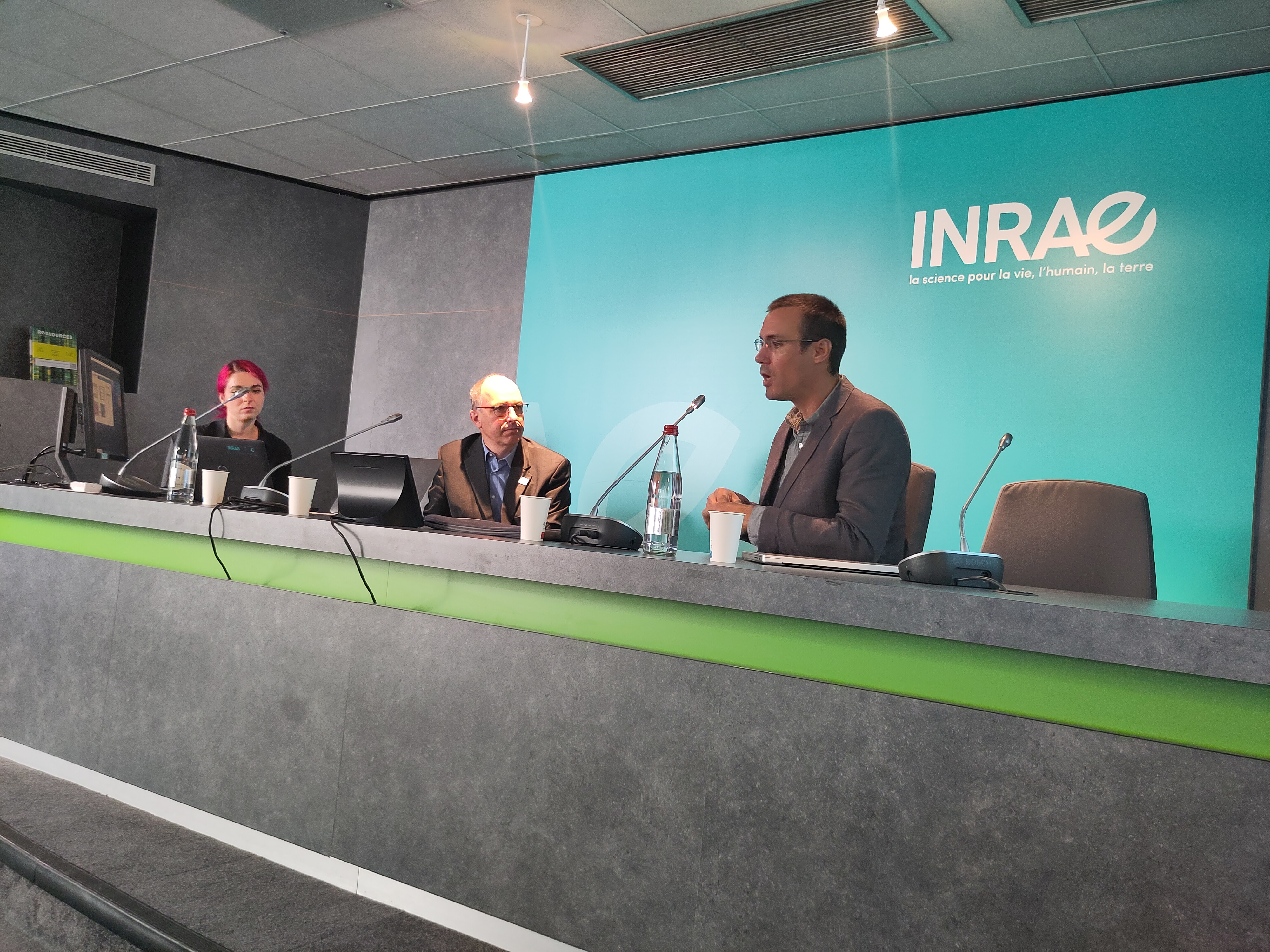
Clément Jonquet from INRAE (leader of the FAIR-IMPACT Work Package 4 -WP4 - titled “Metadata and Ontologies”) discussed the importance of ontology repositories and semantic artefact catalogues (SAC) in EOSC. He focuses on the Ontoportal technology developed by Stanford University and popularised in France recently thanks to FAIR IMPACT.
Why do scientists produce ontologies? To capture and represent domain knowledge, and represent relationships in a machine-interpretable format. But these ontologies are dispersed on the web, produced by different communities that use different formats and standards. These ontologies are also overlapping. Ontology repositories are important to expose, share, manage, and use ontology in a scientific context, they make ontology FAIRness possible. In the FAIR-IMPACT context, we’re talking about semantic artefacts (SA), which include ontology but also easier semantic objects, such as lists, thesaurus, lexique etc.
These SA are able to support semantic interoperability, ensuring that the precise meaning of exchanged data and information is preserved and understood. The FAIR-IMPACT project is interested in these SA lifecycles from creation to documentation, use, storage, share, and preservation. Particularly in the last 3 points in the SA repositories (catalogues) case. In addition, the EOSC interoperability framework has identified SAC as an important component of this framework.
Ontoportal is a generic technology that supports domain-specific ontology catalogues and makes them accessible and usable. Users can publish, download, browse, search, comment, align ontologies and use them for annotation via web service and API. Currently, these are BioPortal, AgroPortal, EcoPortal, MedPortal, MatPortal, IndustryPortal, EarthPortal, BiodivPortal, EscapePortal, and TechnoPortal, developed since 2005. Some of these portals were developed in response to the results shown by FAIR-IMPACT.
WP4 of the FAIR-IMPACT project is focused on SAC, develops and fosters the uptake of a semantic framework for the governance, creation, mapping, sharing, reuse, FAIRness assessment and interoperability of SA for EOSC. As already said, the contribution of this project is the implementation of FAIR-enabling practices across communities and domain-specific research, in particular through the production of various ontology portals. The work on SA repositories is permitted to standardise the way to describe SA, MOD (based on DCAT), and to describe these SA catalogues API.
Salomé Landel from CNRS-DDOR (implicated into WP6 titled “Interoperability”) discussed how SLAs (Service Level Agreements) and MoUs (Memorandum of Understanding) support data interoperability in EOSC context, particularly about legal and organisational interoperability.
SLAs, Service Level Agreements, are tools to clarify service provision, these are written documents provided by a service provider for the benefit of users. They provide a transparent and specific to services framework by specifying criteria for service quality and measurement (availability, frequency of outage, time to restore and response time). It’s a means to clarify the relationship between user and service provider. SLAs are not always legally binding, but can also be based on a best-effort approach (frequently in the academic domain).
MoUs, Memorandum of Understanding, are written documents, legally non-binding, that link two or more parties. They describe terms of a partnership agreement in a wide range of topics, covering pretty much anything. They can be seen as a preliminary step before a more formal, binding agreement.
How to use SLAs and MoUs for data interoperability? First, data interoperability is “the ability of systems and services that create, exchange and consume data to have clear, shared expectations for the contents, context and meaning of the data”. Data interoperability allows data held in any format and context to be used together. We can divide this concept, in the research data case, into legal, technical, semantic and organisational interoperability.
WP 6, of the FAIR-IMPACT project, is focused on the standards definition for each interoperability, with the aim of including these standards into SLAs. To achieve this, they try to integrate interoperability standards into SLAs template (structure). To enable a service provider, with SLAs, to guarantee its users that the data they provide are effectively interoperable. Integrating data interoperability into MoUs asks less description because MoUs are used in partnerships and outline general and strategic intentions.
In the EOSC context, we can see EOSC as another intermediary between data producer, service provider and data users, but currently, we can also see it as a services provider in agreement with others (mailbox, service order management, …). SLAs and MoUs can structure workflows in this context of interconnected services. However, EOSC is multi-actors, we need to define who is responsible for interoperability, and on what scale.
Demonstration session: The use of semantic artefacts in data repositories through case studies
The last part of the meeting was dedicated to some tool demonstrations in the context of French use cases.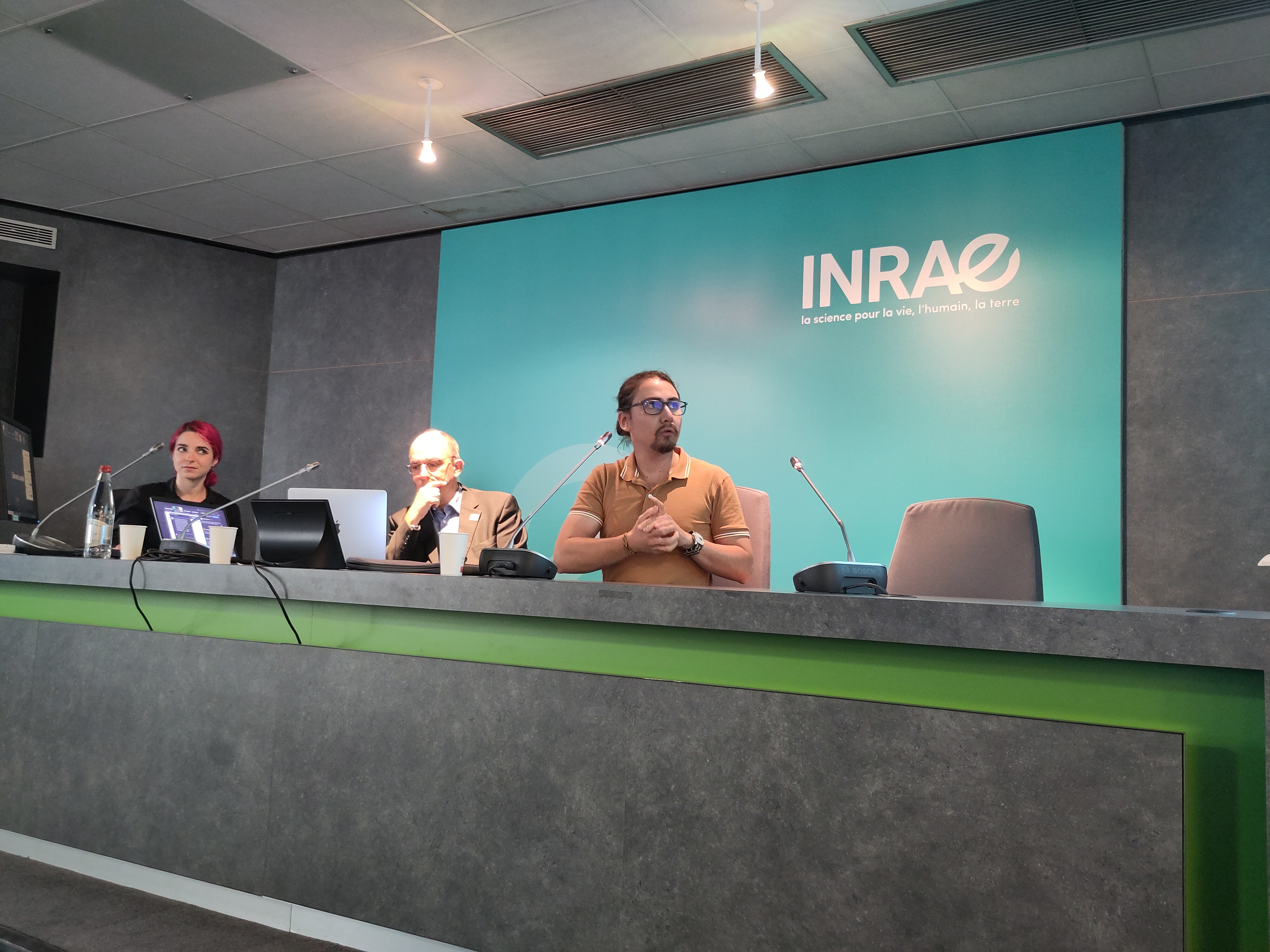
Dimitri Szabo (INRAE) presented the development of a connector between AgroPortal and Data INRAE. AgroPortal is the Agri-Food domain-specific SAC (based on Ontoportal technology), and Data INRAE is the institutional part of Recherche Data Gouv, the French research data repository, based on Dataverse technology. Enabling to describe and search datasets with relevant keywords from controlled vocabularies.
Llorenç Carbrera-Bosquet (INRAE) presented the development of a connector between AgroPortal and PHIS. PHIS is a phenotyping hybrid information system able to store, organise and manage highly heterogeneous (sources, multi-spatial and temporal scale, nature) data. Its goal is to permit data reusability thanks to great associated metadata. AgroPortal gives PHIS-controlled vocabularies that permit to define variables and make links with the various measurement methods.
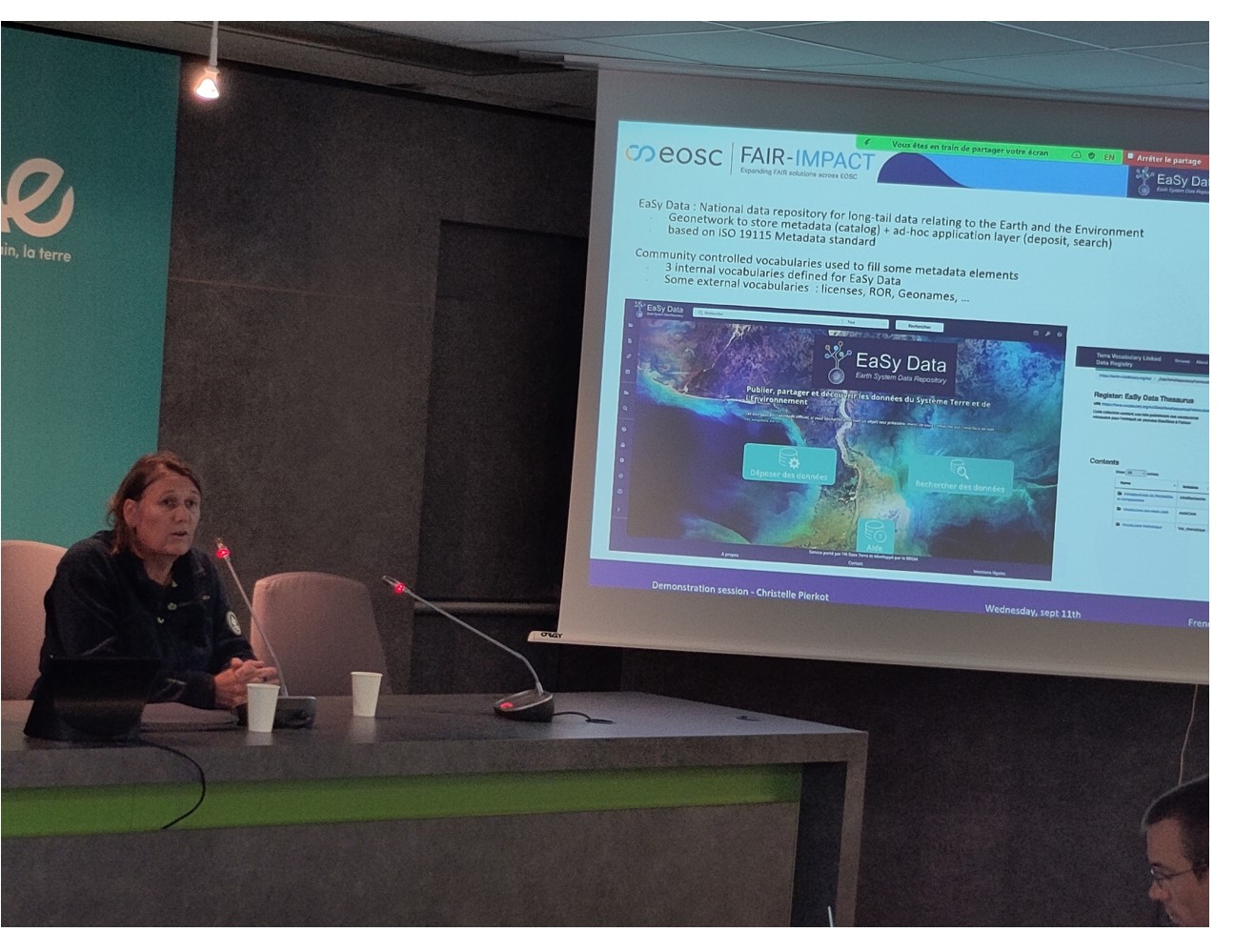 Christelle Pierkot (CNRS - Data Terra) presented the development of a connector between EarthPortal and EasyData (in the context of the research infrastructure Data Terra). EarthPortal is the Earth sciences domain-specific SA catalogues (based on OntoPortal technology), and EasyData is the national data repository for long-tail data relating to the earth and the environment (based on Geonetwork and ISO 19115 metadata standard). Keywords are proposed to data depositors thanks to the EarthPortal annotator functionality.
Christelle Pierkot (CNRS - Data Terra) presented the development of a connector between EarthPortal and EasyData (in the context of the research infrastructure Data Terra). EarthPortal is the Earth sciences domain-specific SA catalogues (based on OntoPortal technology), and EasyData is the national data repository for long-tail data relating to the earth and the environment (based on Geonetwork and ISO 19115 metadata standard). Keywords are proposed to data depositors thanks to the EarthPortal annotator functionality.
Fabrice Jouanot (Grenoble-Alpes University) presented Perscido, an open and interoperable platform for dataset sharing. Into Perscido, (meta)data are based on an ontology, following the standards of Linked Open Data. They want to improve their data interoperability thanks to connections with HAL and Dataverse (Recherche Data Gouv).
For more information :

